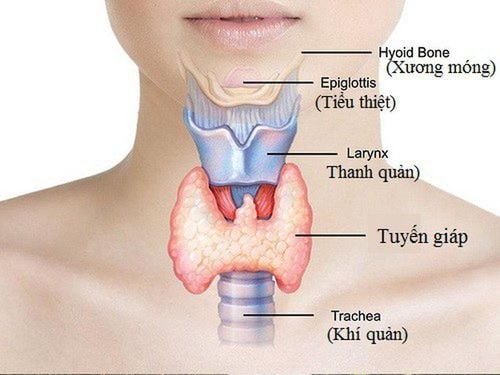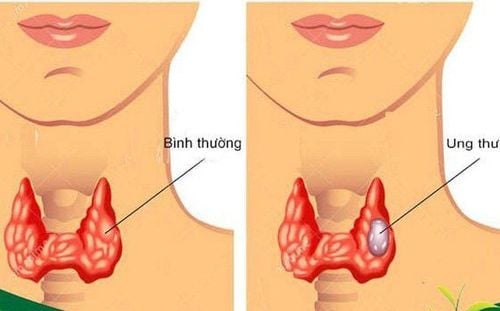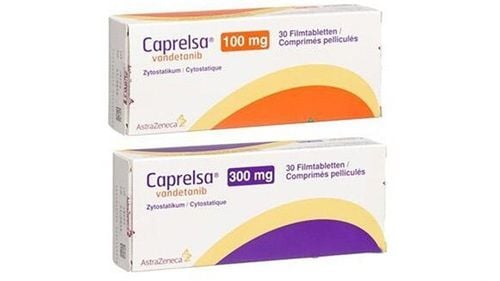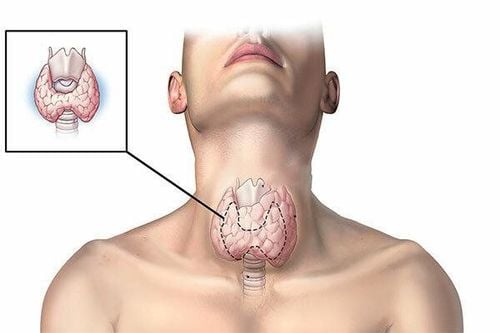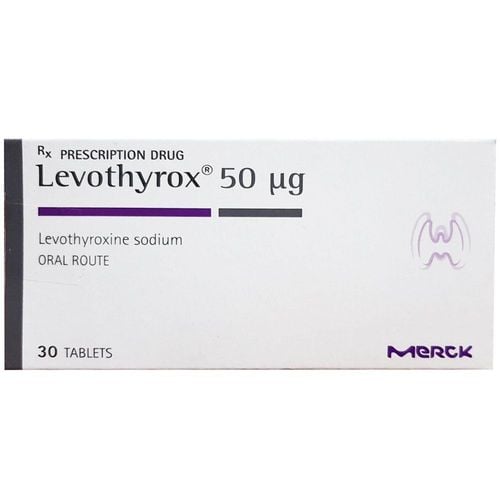This is an automatically translated article.
Thyroid cancer accounts for only 1% of all cancers. However, it accounts for up to 90% of cancers of the endocrine glands. But the mortality rate of thyroid cancer patients is low, and the 5-year survival rate is up to 90%. Currently, there are many treatment methods, so is it possible to treat thyroid cancer with iodine 131?
1. What is thyroid cancer?
Thyroid cancer has a relatively rare incidence compared to other types of cancer. According to statistics in the United States, there are less than 45,000 cases of thyroid cancer (in 2020), while this number is much lower than other cancers such as 200,000 cases of breast cancer, 140,000 cases of colorectal cancer. .
Differentiated thyroid cancer has a 5-year survival rate of up to 90%. Thyroid cancer can be successfully treated and metastasized by surgery with the aid of radioactive iodine 131, even in advanced stage patients.
Today, the incidence of thyroid cancer in both men and women tends to increase faster than other types of cancer. Although, having cancer will be something terrible, but especially for thyroid cancer, it will not be so, it is cured if there is a timely treatment plan.
Thyroid cancer is more common in people with a history of high-dose radiation exposure, or a family history, and people over the age of 40.
Thyroid cancer often has no typical clinical signs or symptoms, and even function tests are within normal limits. Only ultrasound or computed tomography can be used to show the manifestation of thyroid nodules. However, in one specific case, the disease presents as pain in the neck, jaw or ears. It may even put pressure on the esophagus or trachea, causing difficulty breathing and swallowing.
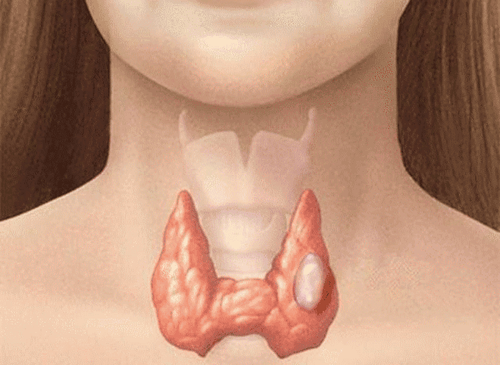
Ung thư tuyến giáp gây ảnh hưởng đến sức khỏe cũng như chất lượng cuộc sống của người bệnh
Thyroid cancer will be classified into the following types:
Papillary thyroid cancer: These cases account for 70-80% of thyroid cancers. This form has a slow disease progression, often metastasizes to the cervical lymph nodes. Despite this, papillary thyroid cancer still has a good prognosis in the presence of lymph node metastases. Follicular thyroid cancer: This follicular form accounts for 10-15% of thyroid cancers. Similar to the papillary type, the cystic form can metastasize to the cervical lymph nodes, but at a faster rate, and moreover, it can metastasize to the bones and lungs. Medullary thyroid cancer: This type of cancer accounts for 5-10%, related to genetics, family history and endocrine problems. Undifferentiated thyroid cancer: This is the most malignant form of cancer and the ability to respond poorly to treatment is less than 2%.
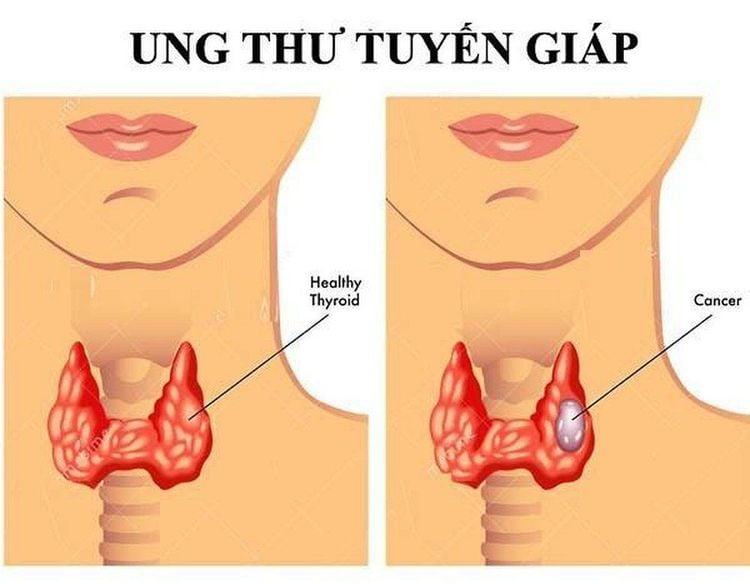
Ung thư tuyến giáp có rất nhiều thể
2. Treatment of thyroid cancer with iodine 131
Treatment of thyroid cancer by total thyroidectomy and cervical lymphadenectomy is often applied. Often, early-stage thyroid cancer may require surgery alone. But for specific cases with cervical lymph node metastasis, the treating doctor will appoint additional thyroid cancer treatment with i 131 after surgery. Patients who have undergone total thyroidectomy will need to take thyroid hormone medication for the rest of their lives.
Treat i131 because the thyroid is able to absorb iodine quite well. Therefore, I131 can be used effectively in destroying remaining thyroid tissue (benign and cancerous) after surgery. I131 after being absorbed into the body will destroy DNA and cause thyroid cell death. At the same time, because it does not have the property of capturing I131, other cells in other organs of the body are less susceptible to this radioactive substance. In some patients, I131 also affects the salivary glands and causes side effects such as dry mouth. Furthermore, high doses of I131 may be a risk factor for other cancers, but the incidence of this condition is extremely low. However, before treatment, doctors also need to consult and choose to balance the benefits and possible risks of treatment.
Before I131 treatment, the treating doctor will instruct the patient to stop using thyroid hormone for 4 to 6 weeks, increase the absorption of I131 to achieve maximum treatment effect. When indicators such as TSH reach the required level, the doctor will assign the patient to take a small dose of I131 and take diagnostic scans with I131. This test will help the doctor to estimate the amount of thyroid tissue that needs to be destroyed as well as evaluate for distant metastases in the lungs and other sites.

Điều trị ung thư tuyến giáp bằng iod 131 đem lại hiệu quả điều trị cao cho người bệnh
Treatment of advanced thyroid cancer. Although surgery and treatment of I131 are the two main methods, sometimes it is not an effective method. In this case, external radiation therapy can be applied to treat bone metastases and other metastases. Radiation therapy can slow the growth and spread of malignant cells. Moreover, targeted therapy may also be a new method that is being studied and initially applied to patients with advanced thyroid cancer.
Besides, periodic follow-up of patients with thyroid cancer is necessary because the disease may still recur after treatment. The main tests to do during follow-up are a neck ultrasound and a blood test. In addition, patients need to take thyroid hormone medication from the time of their thyroidectomy for the rest of their lives. More than half, the Tg index is also an important cancer marker in the follow-up of thyroid patients. Because Tg is a protein produced by most types of thyroid cancer cells and thyroid tissue. Therefore, when the whole thyroid surgery is done, it is necessary to treat tissue destruction with I131. The Tg index is used for monitoring, so if it is high in the serum, it can be suspected that the disease is recurrent. However, more tests are still needed to make an accurate diagnosis. Despite this, up to 25% of patients are unable to have an accurate tg quantification due to abnormally high serum levels of Tg antibodies (ATg). Furthermore, in patients at high risk of relapse, diagnostic imaging with I131 after stopping hormone therapy can also be used as adjunct to Tg test and neck ultrasound.
In general, the prognosis of thyroid cancer, especially for patients under 45 years of age and with small tumor sizes, is good. But for patients over 45 years old, with large, invasive tumors, the recurrence rate of this group is also quite high. However, the prognosis is often poor for patients undergoing radical surgery and adjuvant I131 therapy. But patients can still live for a long time even though they still have the heavy psyche of a cancer carrier. The most important thing here is that the patient needs to coordinate with the doctor to be able to closely follow up after the treatment.

Khách hàng có thể đến Vinmec để được tầm soát, sàng lọc các bệnh lý về tuyến giáp
Thyroid diseases are often left undiagnosed in 20-60% of the total population. That is the reason for Vinmec to launch a package of screening and screening for thyroid diseases. Vinmec's screening package for thyroid diseases helps:
Check thyroid function. Screening & early detection of common thyroid diseases such as simple goiter, hyperthyroidism, hypothyroidism, thyroiditis, thyroid nodules, thyroid cancer, etc. appropriate and timely treatment. When registering for the package of screening and screening for thyroid diseases, customers will be examined and consulted with an Endocrinologist; Thyroid ultrasound; Screening tests for thyroid diseases: FT3, FT4, TSH, Anti - TPO, Anti TG;,.. After the results are available, the patient will receive advice as well as effective treatment methods, provide a good prognosis for patients.
Please dial HOTLINE for more information or register for an appointment HERE. Download MyVinmec app to make appointments faster and to manage your bookings easily.




